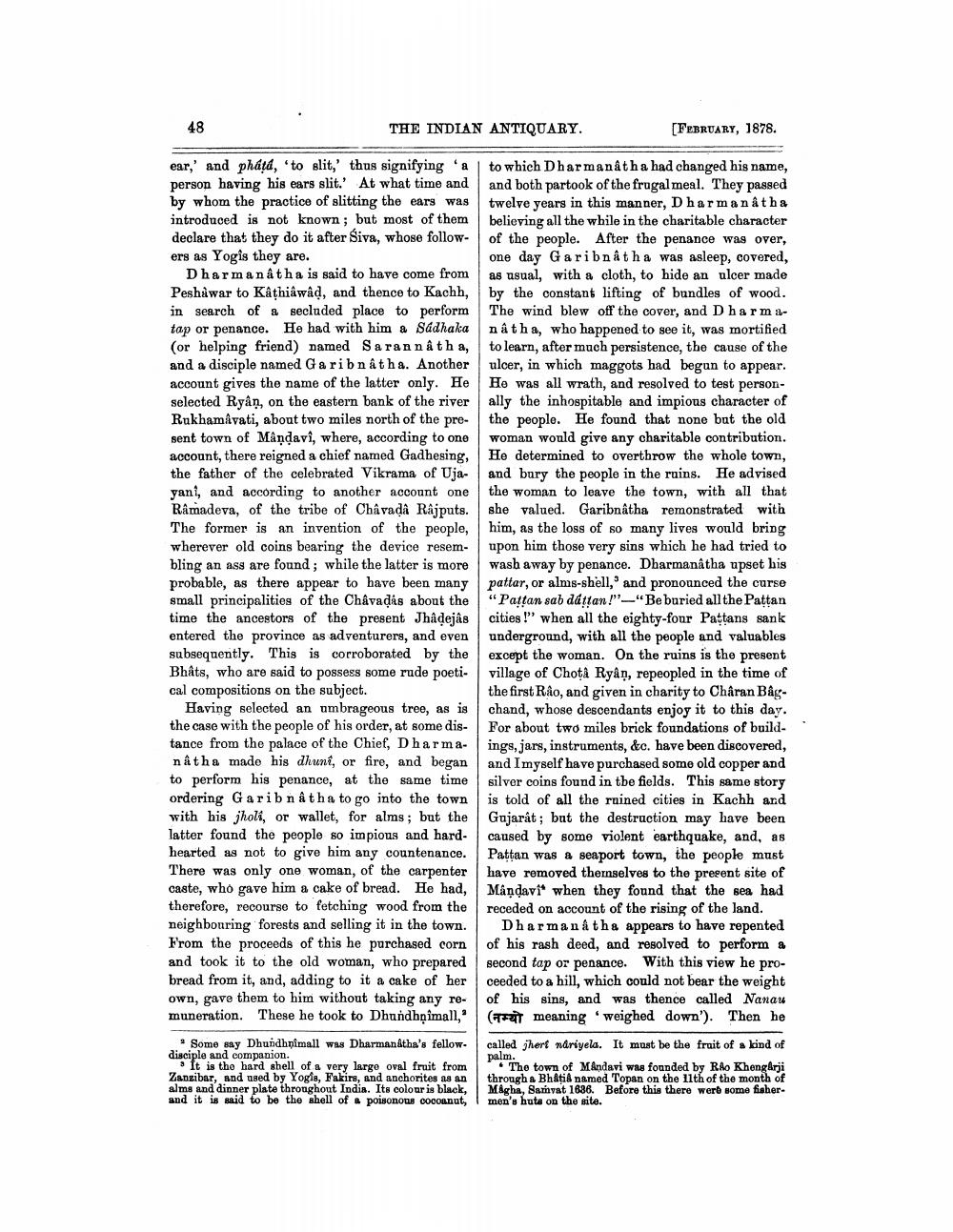________________
48
THE INDIAN ANTIQUARY.
ear, and phátá, 'to slit,' thus signifying 'a person having his ears slit.' At what time and by whom the practice of slitting the ears was introduced is not known; but most of them declare that they do it after Śiva, whose followers as Yogis they are.
Dharmanatha is said to have come from Peshawar to Kâthiâwâd, and thence to Kachh, in search of a secluded place to perform tap or penance. He had with him a Sádhaka (or helping friend) named Sarannâ tha, and a disciple named Garibnâtha. Another account gives the name of the latter only. He selected Ryân, on the eastern bank of the river Rukhamavati, about two miles north of the present town of Mânḍavi, where, according to one account, there reigned a chief named Gadhesing, the father of the celebrated Vikrama of Ujayant, and according to another account one Râmadeva, of the tribe of Châvada Rajputs. The former is an invention of the people, wherever old coins bearing the device resembling an ass are found; while the latter is more probable, as there appear to have been many small principalities of the Châvaḍas about the time the ancestors of the present Jhâdejâs entered the province as adventurers, and even subsequently. This is corroborated by the Bhâts, who are said to possess some rude poetical compositions on the subject.
Having selected an umbrageous tree, as is the case with the people of his order, at some distance from the palace of the Chief, Dharmanatha made his dhunt, or fire, and began to perform his penance, at the same time ordering Garib na tha to go into the town with his jhol, or wallet, for alms; but the latter found the people so impious and hardhearted as not to give him any countenance. There was only one woman, of the carpenter caste, who gave him a cake of bread. He had, therefore, recourse to fetching wood from the neighbouring forests and selling it in the town. From the proceeds of this he purchased corn and took it to the old woman, who prepared bread from it, and, adding to it a cake of her own, gave them to him without taking any remuneration. These he took to Dhundhaimall,
Some say Dhundhnîmall was Dharmanatha's fellowdisciple and companion.
It is the hard shell of a very large oval fruit from Zanzibar, and used by Yogis, Fakirs, and anchorites as an alms and dinner plate throughout India. Its colour is black, and it is said to be the shell of a poisonous cocoanut,
[FEBRUARY, 1878.
to which Dharmanâtha had changed his name, and both partook of the frugal meal. They passed twelve years in this manner, D harmanâtha believing all the while in the charitable character of the people. After the penance was over, one day Garibnatha was asleep, covered, as usual, with a cloth, to hide an ulcer made by the constant lifting of bundles of wood. The wind blew off the cover, and Dharmanátha, who happened to see it, was mortified to learn, after much persistence, the cause of the ulcer, in which maggots had begun to appear. He was all wrath, and resolved to test personally the inhospitable and impious character of the people. He found that none but the old woman would give any charitable contribution. He determined to overthrow the whole town, and bury the people in the ruins. He advised the woman to leave the town, with all that she valued. Garibnâtha remonstrated with him, as the loss of so many lives would bring upon him those very sins which he had tried to wash away by penance. Dharmanâtha upset his pattar, or alms-shell,' and pronounced the curse "Paṭṭan sab dáṭṭan!"-"Be buried all the Pattan cities!" when all the eighty-four Pattans sank underground, with all the people and valuables except the woman. On the ruins is the present village of Chotâ Ryân, repeopled in the time of the first Rao, and given in charity to Châran Bâgchand, whose descendants enjoy it to this day. For about two miles brick foundations of buildings, jars, instruments, &c. have been discovered, and I myself have purchased some old copper and silver coins found in the fields. This same story is told of all the rained cities in Kachh and Gujarât; but the destruction may have been caused by some violent earthquake, and, as Pattan was a seaport town, the people must have removed themselves to the present site of Mandavi when they found that the sea had receded on account of the rising of the land.
Dharmanatha appears to have repented of his rash deed, and resolved to perform a second tap or penance. With this view he proceeded to a hill, which could not bear the weight of his sins, and was thence called Nanau ( meaning weighed down'). Then he
called jhert nariyela. It must be the fruit of a kind of palm. The town of Mandavi was founded by Rao Khengårji through a Bhatia named Topan on the 11th of the month of Magha, Samvat 1686. Before this there were some fishermen's huts on the site.




